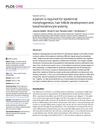Epimorphin Expression During Human Fetal Hair Follicle Development
September 1999
in “
British Journal of Dermatology
”
epimorphin mesenchymal protein hair follicle development pregerm stage hair germ hair peg perifollicular dermal mesenchymal cells bulbous hair peg lanugo hair follicle dermal papilla cells hair follicle morphogenesis hair peg elongation bulb formation follicular epithelium hair follicle hair growth hair development skin cells hair bulb hair stem cells

TLDR Epimorphin, a protein, plays a key role in the development of hair follicles in human fetuses, but it doesn't help in maintaining the stem cell population of the follicular skin layer.
In 1999, a study was conducted on the role of epimorphin, a mesenchymal protein, in human fetal hair follicle development. The researchers studied skin samples from human fetuses at various gestational ages and found that epimorphin was expressed at different stages of hair follicle development. It was present in the mesenchymal cell condensation at the pregerm stage, around the hair germ, in the neck portion of the hair peg, and in the perifollicular dermal mesenchymal cells of the bulbous hair peg. In the lanugo hair follicle stage, dermal papilla cells expressed epimorphin. The study suggested that epimorphin may play a crucial role in hair follicle morphogenesis, including the elongation of the hair peg and the induction of bulb formation. However, it was not involved in preserving the stem cell population of the follicular epithelium. At the time, no studies had been conducted on epimorphin expression patterns during the adult hair cycle.



